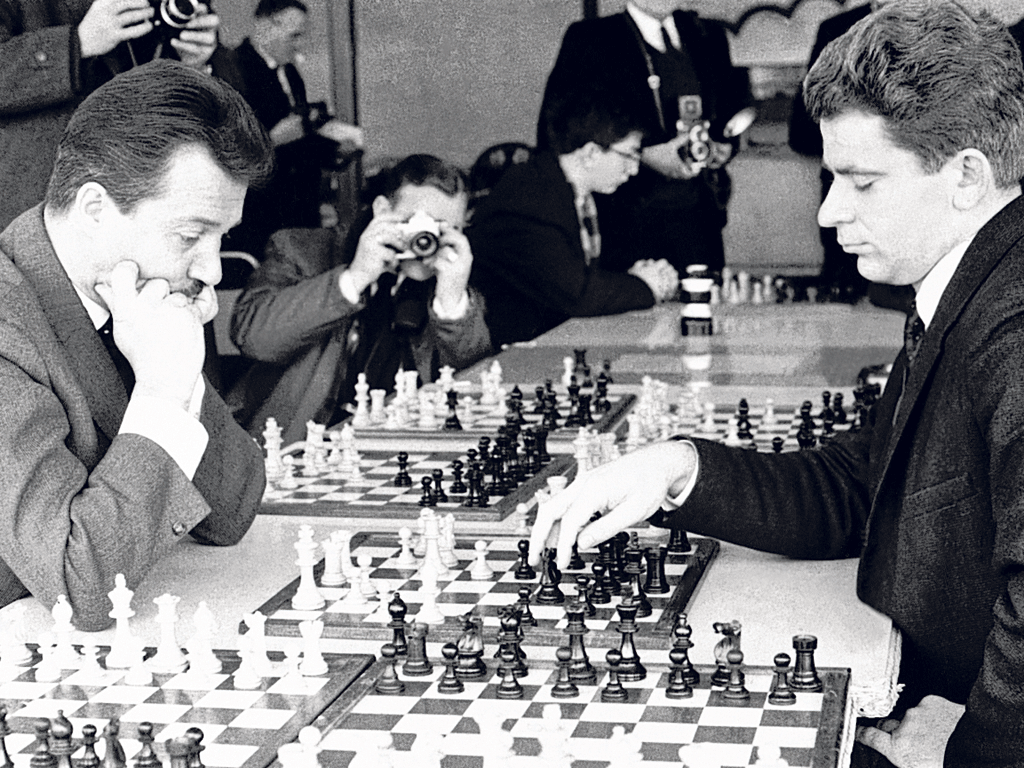Svetozar Gligoric: Grandmaster who challenged Soviet dominance

Svetozar Gligoric was among the world's top 10 chess players during the 1950s and 1960s, and was considered one of the world's best players never to win the world championship, although he did go close.
An articulate commentator and writer, Gligoric was an engaging character widely admired for his no-nonsense approach to the game, avoiding psychological and personal battles and self-aggrandisement. The title of his 2002 autobiography was I Play Against Pieces (2002) – not against the man. "For me," he said, "it was not important who the opponent was sitting across from me, it was important that I play correct and active chess."
Gligoric won the Yugoslavian championship a record 12 times between 1947 and 1971, played at 15 biennial Chess Olympiads, leading the team to six silver and five bronze medals, and gold in 1950 in Dubrovnik, ahead of the powerful Soviet Union. Gligoric was among a handful who posed a threat to Soviet dominance, particularly in individual games; this was highlighted with his seven victories against Tigran Petrosian and five against Vasily Smyslov, when these world champions were at their peak. Max Euwe, Mikhail Botvinnik, Mikhail Tal and Bobby Fischer were other world champions who fell to Gligoric.
However, although a candidate for the world title on three occasions (1953, 1959 and 1968), Gligoric never succeeded in becoming world champion. The intervention of the war was a factor in slowing his progress, as well as changes to the qualifying cycle and his age. In the 1968 tournament, following a format change to a series of matches, he lost in the quarter-finals to Tal in Belgrade. He had taken an early lead, but unwisely switched strategies in the sixth game and lost after reading criticism in newspapers that the games were boring.
Born into a poor family in Belgrade in 1923, Svetozar Gligoric started watching chess at the local bar and began playing at the age of 11, when he was taught by a boarder living in the house. He made his first chess set by carving the corks from wine bottles. At 15 he won his first tournament, becoming the 1938 Belgrade Chess Club Champion; a year later he was a master. By the time he was 17, he had lost both his parents but was taken in by Niko Miljanic, a professor who knew him through chess.
During the Second World War Gligoric joined General Tito's partisans fighting the Nazis, rising to captain. After the war, his chess career resumed in earnest in Warsaw in 1947, when he won his first international tournament ahead of two of the Soviet Union's best players, including Smyslov, a future world champion.
In 1950 he became an International Master following success at the Mar del Plata tournament in Argentina, and a year later became a grandmaster. Further tournament success came from events in Stockholm 1954, Belgrade 1964, Manila 1968, Lone Pine (California) 1972 and 1979, among others. He was a regular competitor at the Hastings Premier, East Sussex, winning or tying for first on five occasions between 1951 and 1963.
In the early 1970s, when numerical ratings were first introduced, Gligoric was ranked No 15, and remained in the top 100 until 1987, when he was in his mid-sixties. He played his last tournament, the 2003 Rilton Cup, at of 80.
Gligoric, who favoured ambitious but risky openings, will best be remembered as an openings theorist and commentator. He made enormous contributions to the theory and practice of the King's Indian Defence, Ruy Lopez and Nimzo-Indian Defence, among others, and particularly with the King's Indian, translating his theoretical contributions into several spectacular victories with both colours.
Fluent in several languages, Gligoric also worked as a tournament organiser and a journalist, writing columns for the American magazines Chess Review and Chess Life, as well as writing a number of books, including, notably, Fischer v Spassky: The Chess Match of the Century, an account of the two men's epic struggle for the 1972 World Championship in Reykjavik, which sold close to half a million copies.
In 1958, Gligoric had befriended the 15-year-old Fischer when he came to Europe and later recounted how Fischer had quizzed him about a critical opening position in the Sicilian Defence. Innocently, Gligoric told all he knew. A few weeks later, they met in the final round of the interzonal tournament, reached the key position, and Fischer promptly unleashed an innovative move. Gligoric managed to hold on for a draw, and both qualified for the Candidates Tournament.
He remained friends with the American, and helped persuade him out of retirement for his 1992 rematch with Spassky. Fearing he would be rusty, Fischer asked Gligoric to play a secret 10-game training match, which Fischer won narrowly.
Besides chess his most enduring passion was music, and, in 2011 he released a CD featuring compositions that drew on jazz, ballads and rap. He compared music to chess, "Each note is a move and from these elements you create your own architecture with known rules."
Gligoric received a number of state awards in Yugoslavia, including being voted 1958 Sportsman of the Year. In 1978 he narrowly failed in a bid to become head of chess's world governing body, Fide. He was chief arbiter of the marathon 1984-85 world title match between Anatoly Karpov and Garry Kasparov. When Yugoslavia broke up in the 1990s, Gligoric lived in Serbia.
Svetozar Gligoric, chess player, author and journalist; born Belgrade, Yugoslavia 2 February 1923; married 1947 Danica (died 1994); died Belgrade, Serbia 14 August 2012.
Join our commenting forum
Join thought-provoking conversations, follow other Independent readers and see their replies
Comments
Bookmark popover
Removed from bookmarks